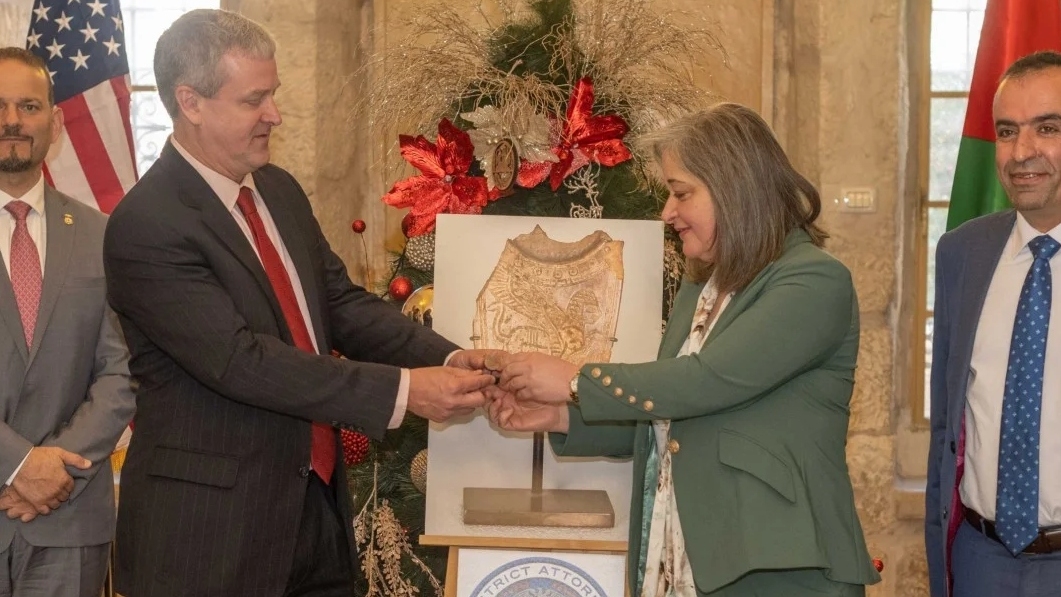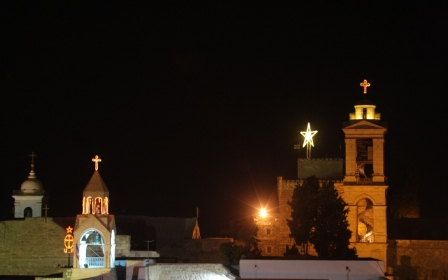US returns 2,700-year-old looted cosmetic spoon to Palestine

United States officials returned a 2,700-year-old looted artefact to the Palestinian government in an official ceremony in Bethlehem on Thursday.
The "cosmetic spoon", which was carved from ivory between 800 and 700 BCE, was handed back by George Noll, head of the US Office of Palestinian Affairs, to the Palestinian Authority's tourism and antiquities minister, Rula Maayah.
In a statement, the US office called the transfer a "historic event", after the artefact was discovered during an investigation of items held by Michael Steinhardt, a prominent New York venture capitalist and ancient art collector.
Investigators seized 180 stolen antiquities valued at $70m from Steinhardt in 2021. He agreed to a lifetime ban on collecting and buying more antiquities.
The cosmetic spoon was used to pour incense at rituals venerating the gods and the dead. A winged figure was etched on its side.
Stay informed with MEE's newsletters
Sign up to get the latest alerts, insights and analysis, starting with Turkey Unpacked
"This artefact is important as it acquires its real scientific and archaeological value in its authentic location," Maayah said. Noll called it "an example of Palestinian cultural patrimony".
According to US investigators, the item dates back to the Assyrian civilisation and was likely stolen from Hebron, in the occupied West Bank.
Artefacts returned to Israel
However, the single artefact being returned to the Palestinians is a fraction of what might be owed to them.
Several other items that were found in Hebron and in other areas of the West Bank are being returned instead to Israel.
As part of their conclusion, New York prosecutors said all 40 of the items illegally taken from Israel and the Palestinian territories should be returned to Israel.
Justifying their decision, the US prosecutors said: "The looting took place either at an area within Israel's borders or at an area over which Israel exercises legal authority."
The ruling seemed to give Israeli ownership of all West Bank artefacts, regardless of where they were found.
At the time, Wael Hamamra, head of the Palestinian Ministry of Tourism and Archaeology, said the Steinhardt settlement was unjust.
He told AFP that the collection included "Palestinian archaeological artefacts (that) should be returned to their place of origin".
Israel is the only country in the Middle East that permits state-licensed antiquities dealers to sell ancient artefacts.
It is also one of the few countries in the world that has sanctioned antiquities trading among private dealers.
As a result, Israel has become a hotspot for the black market trade in buying and selling artefacts.
And, unlike the Palestinian Authority, it has not ratified the 1970 Unesco convention against illicit trade in antiquities.
Israel has tense relations with the Paris-based agency, after it became the first in the United Nations system to accept Palestine as a member state, in 2011.
This article is available in French on Middle East Eye French edition.
Middle East Eye delivers independent and unrivalled coverage and analysis of the Middle East, North Africa and beyond. To learn more about republishing this content and the associated fees, please fill out this form. More about MEE can be found here.





